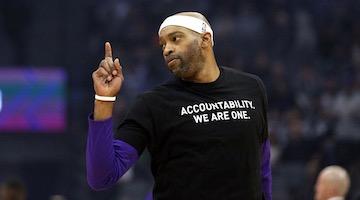Ten chapters of the national Black Lives Matter organization are in open revolt against the individuals that have treated the mass movement as their personal vehicle for upward political, professional and financial advancement.
“The BLMGNF became the principal beneficiary of millions of dollars in individual and corporate philanthropy.”
In 2013 three Black women social activist friends working in non-profit organizations in California invented the hashtag #BlackLivesMatter which, along with #Ferguson, became most identified with the mass movement that converged on Ferguson, Missouri, following the police killing of Mike Brown, in August of 2014. Soon the friends created a non-profit pocket to gather funds for favored projects, dubbed the Black Lives Matter Global Network Foundation. The BLMGNF became the principal beneficiary of millions of dollars in individual and corporate philanthropy, as the social movement broadly described as “Black Lives Matter” mounted the greatest challenge to the racist criminal justice system in the United States since the 1960s. Yet, the disposition of these funds has remained solely at the discretion of the three hashtag and foundation founders -- Patrisse Cullors, Alicia Garza, and Opal Tometi – and their designated operatives.
Ten chapters of the national Black Lives Matter organization are now in open revolt against the hashtag founders and their tightly controlled formations, demanding that the BLMGNF and the recently created Black Lives Matter Political Action Committee and BLM Grassroots be made financially and political “accountable.”
Over the past six years Black Agenda Report has often been critical of the “troika” that treats the mass movement as their personal vehicle for upward political, professional and financial advancement. We hope that the revolt of Black Lives Matter chapters will spark a deep and wide examination of the direction of the U.S.-based Black liberation movement and its relationship to the global struggle against racial capitalism and Euro-American imperialism. This crucial debate now begins in earnest with the “Statement from the Frontlines of the BLM,” issued earlier this week by chapters in Philadelphia; Washington, D.C.; Chicago; Hudson Valley, New York; Oklahoma City; Indianapolis; Denver; Vancouver, Washington; San Diego, California; and New Jersey. The statement appears below in its entirety:
It is Time for Accountability
It was recently declared that Patrisse Cullors was appointed the Executive Director to the Black Lives Matter Global Network (BLMGN) Foundation. Since then, two new Black Lives Matter formations have been announced to the public: a Black Lives Matter Political Action Committee, and BLM Grassroots. BLM Grassroots was allegedly created to support the organizational needs of chapters, separate from the financial functions of BLMGN. We, the undersigned chapters, believe that all of these events occurred without democracy, and assert that it was without the knowledge of the majority of Black Lives Matters chapters across the country and world.
We became chapters of Black Lives Matter as radical Black organizers embracing a collective vision for Black people engaging in the protracted struggle for our lives against police terrorism. With a willingness to do hard work that would put us at risk, we expected that the central organizational entity, most recently referred to as the Black Lives Matter Global Network (BLMGN) Foundation, would support us chapters in our efforts to build communally. Since the establishment of BLMGN, our chapters have consistently raised concerns about financial transparency, decision making, and accountability. Despite years of effort, no acceptable internal process of accountability has ever been produced by BLMGN and these recent events have undermined the efforts of chapters seeking to democratize its processes and resources.
In the spirit of transparency, accountability, and responsibility to our community, we believe public accountability has become necessary. As a contribution to our collective liberation, we must make clear:
- Patrisse Cullors, as the sole board member of BLMGN, became Executive Director against the will of most chapters and without their knowledge.
- The newly announced formation, BLM Grassroots, does not have the support of and was created without consultation with the vast majority of chapters.
- The formation of BLM Grassroots effectively separated the majority of chapters from BLMGN without their consent and interrupted the active process of accountability that was being established by those chapters.
- In our experience, chapter organizers have been consistently prevented from establishing financial transparency, collective decision making, or collaboration on political analysis and vision within BLMGN
- For years there has been inquiry regarding the financial operations of BLMGN and no acceptable process of either public or internal transparency about the unknown millions of dollars donated to BLMGN, which has certainly increased during this time of pandemic and rebellion.
- To the best of our knowledge, most chapters have received little to no financial support from BLMGN since the launch in 2013. It was only in the last few months that selected chapters appear to have been invited to apply for a $500,000 grant created with resources generated because of the organizing labor of chapters. This is not the equity and financial accountability we deserve.
We remain committed to collectively building an organization of BLM chapters that is democratic, accountable, and functions in a way that is aligned with our ideological values and commitment to liberation. We will move forward with transparency and expound on our collective efforts to seek transparency and organizational unity in a fuller statement in the near future. As we collectively determine next steps, we encourage our supporters to donate directly to chapters, who represent the frontline of Black Lives Matter.
A Fork in the Road for the Movement
Movements are comprised of many components — including timely hash tag purveyors like Garza, Cullors and Tomati. It is to be expected that the various elements that emerge from social upheaval will pursue their own class and professional interests, engendering vigorous debate over the direction and nature of struggle. Black Agenda Report views the chapters’ challenge to the troika’s self-serving monetization of the first mass resistance to the racist rule of rich white men since mass Black incarceration was imposed at the tail end of the Sixties, as both welcome and overdue. As BAR editor and columnist and Black Alliance for Peace national organizer Ajamu Baraka writes in this issue, the chapters that are “raising questions about BLM from the frontlines are doing so not out of a desire to destroy but to strengthen the movement by generating this discussion.” If the Cullors-Garza-Tomati trio treats the movement as their legal property, it is because the corporate state only recognizes property relations, not human and social rights and claims. The trio have parlayed their notoriety and the trust invested in them by grassroots activists to pull the movement into the matrix of big business philanthropy and corporate Democratic politics — the cemetery of people’s struggles. But the movement refuses to be bought or buried.
BAR executive editor Glen Ford can be contacted at Glen.Ford@BlackAgendaReport.com.
COMMENTS?
Please join the conversation on Black Agenda Report's Facebook page at http://facebook.com/blackagendareport
Or, you can comment by emailing us at comments@blackagendareport.com



















